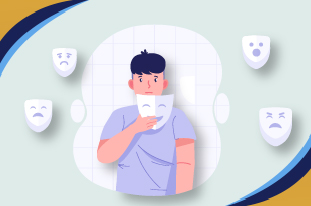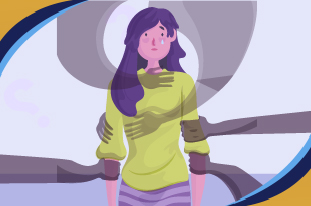Have you ever felt like your thoughts are deceiving you or you can see things that others can’t? If yes, it might be psychosis. Psychosis is a state of mind in which individuals can hear, see, and even smell things that are not present in real life. However, overcoming psychosis is possible with the right medication and therapeutic approaches.
This article helps you understand what psychosis is, episodes of psychosis, factors that cause psychosis, and what treatments are available to reduce the symptoms.
Understanding psychosis
Psychosis is a mental health condition in which individuals feel like living in nightmares.
Every individual experiences psychosis in a different way, some people experience it for weeks and some experience it for months or years. However, the first episodes of psychosis start at the age of 20 to 25. Diagnosing it earlier can help in managing the symptoms earlier.
What does it feel like to experience psychosis?
Psychosis can happen to anyone; around one in every three individuals experiences psychosis at some time in their life.
Read More: Unfolding The Facts About Stress Induced Psychosis
Here is how it feels:
-
Hallucinations:
They may see, touch, and hear things that do not have any connection with reality. Individuals become wildly fearful and sometimes faint as well. For example, they feel something crawling on their body.
-
Delusions:
Individuals in this state hold strong beliefs in false things. For example, having superpowers, or thinking that people are planning some secret missions.
-
Social dysfunction:
They may tend to live alone and isolated, and avoid social gatherings and think that everyone is going to harm them.
-
Disturbances in sleep cycle:
The excessive fear, dread, and paranoia cause disturbances in the sleep cycle and lead to insomnia.
-
Intensely emotional:
People with psychosis are emotionally weak due to depression, anxiety, and low energy levels.
-
Decline in hygiene:
People experiencing psychosis have difficulties in cognitive abilities which leads them towards decline in hygiene.
-
Confusion and disorganization:
People with psychosis have mixed up disorganized thoughts which lead to difficulties in communication. Moreover, they speak slowly and have difficulty conveying their ideas.
-
Suicidal thoughts:
Individuals with psychosis remain frightened all the time, which further leads them towards the thought of suicide.
-
Behavioral changes:
Individuals with psychosis have unpredictable behavior that occurs due to hallucinations and delusions.
Read More: A Guide To Understand Smiling Depression

What are the types of psychosis?
Psychosis can also comorbid with other mental health conditions, and causes severe issues in everyday life.
Here are some of the common types of psychosis, these include:
-
Schizophrenia:
Schizophrenia is a severe psychotic condition which negatively impacts the way of thinking, feeling, and behaving. Individuals suffering from schizophrenia have difficulties in distinguishing between the real world and imaginary world. However, schizophrenia severely impacts cognitive functioning and individuals have difficulty in organizing their thoughts.
-
Brief Psychotic Disorder:
Brief psychotic disorder usually occurs for a short time, particularly less than a month or just for one day. It arises suddenly after experiencing a stressful event and causes hallucinations and false beliefs. However, brief psychotic disorder can occur at any age but usually it occurs in adulthood.
-
Schizophreniform Disorder:
It’s a psychotic mental health condition that is similar to schizophrenia. However, the main difference is schizophrenia lasts for more than six months and schizophreniform disorder lasts for less than six months. It can be diagnosed with the DSM-5-TR if an individual has the symptoms of hallucination, delusions, and disorganized thought for less than six months.
-
Schizoaffective Disorder:
Schizoaffective is a complex psychotic condition that has the symptoms of schizophrenia as well as mood disorder. Individuals suffering from schizoaffective disorder have false beliefs, they see and experience things that have no connection with reality.
-
Delusional disorder:
Individuals with delusional disorder have a strong belief in the things they see or imagine. They have a very strong belief they are being poisoned, someone is following them, or being deceived by someone. However, these are only the misinterpretations of their thoughts.
Read More: Causes of Schizophrenia: Is Schizophrenia Genetic?
For example, they have a false belief that some of their organs are being removed from their body.
What are the factors that contribute to the development of psychosis?
The main reason for psychosis is still under research, but several factors may contribute to the development of psychosis.
Some of the common factors include:
-
Genetics:
Psychosis is a heritable condition, if a close family member is suffering from this condition, there are high chances that you may also develop it. It tends to run in families and causes severe issues.
-
Substance use:
Excessive use of substances can trigger the development of psychosis.
Here are some of the drugs that increase the vulnerability of developing psychosis, these include:
- Cocaine
- MDMA
- LSD (acid)
- Ketamine
- psilocybins (magic mushrooms)
- Alcohol
-
Environmental factors
There are many different environmental factors that may increase the vulnerability of psychosis. These include:
- Immature birth
- Stressful life events
- Being born in winter
- Head injury in childhood
- Displacement
Note: It’s not always necessary that an individual with psychosis have all environmental factors. They might have one, two, or may be none of these but still struggling with psychosis.
-
Childbirth:
Hormonal changes, stress during pregnancy, or difficulty in childbirth may lead to the development of postpartum psychosis. However, you are more likely to develop postpartum psychosis if you are already suffering from any mental health condition.
-
Brain changes:
The dysregulation of brain chemicals such as dopamine activity may lead to hallucinations and delusions. The disturbance of neurotransmitters can also occur due to stressful life experiences, which further leads to psychosis.
-
Medications:
In some cases psychosis can also occur due to the excessive use of medication. It can be triggered by the side effects of the medications.
Note: Never start medications without the advice of a professional healthcare expert.
-
Psychological factors:
Individuals who have experienced trauma, childhood abuse, wars, or lost a loved one, are more vulnerable to the development of psychosis. However, you can also develop psychosis if you have severe issues with sleep as it further leads to psychosis.
Read More: What is Trauma Dumping and How to Stop It?
How to diagnose psychosis?
The diagnosis of psychosis can be done by a professional healthcare expert. It can be diagnosed by the criteria of DSM-5 and ICD-10. A mental healthcare professional will conduct a comprehensive medical assessment to diagnose psychosis.
Here is how a healthcare professional can diagnose psychosis:
- They usually conduct a clinical interview and do some questionnaires to observe the behavior and speech.
- They often ask you to get some blood tests to check if the psychosis is caused by substance abuse or other medical conditions.

What are the treatments for psychosis?
Psychosis can be treated with the combination of medications and therapeutic approaches. Here are some of the medications and therapies that may help you to alleviate the symptoms.
Medications:
Medications for treating psychosis are as follows:
- Chlorpromazine
- Haloperidol
- Fluphenazine
- Clozapine
- Olanzapine
- Risperidone
- Aripiprazole
- Quetiapine
- Ziprasidone
- Lurasidone
- Paliperidone
Psychotherapy:
Psychotherapy, also known as talk therapy, is used to treat several mental disorders, including psychosis. Some of the common therapies that are used to treat psychosis are CBT and family therapy etc. However, sometimes a healthcare professional uses a combination of two or more therapies to meet the desired mental health needs of the individuals.
Cognitive behavioral therapy:
CBT is an evidence-based treatment that has proven effectiveness for treating psychosis. It involves identifying negative thoughts and feelings that are bothering. CBT targets unsettling thoughts and beliefs by intervening in thoughts and behaviors and changing them into helpful ones. CBT helps in identifying when psychotic symptoms are arising and helps them to overcome it.
Group therapy:
Group therapy plays an important role in reducing the symptoms of psychosis. Individuals in group therapy meet other individuals who are suffering from the same mental health condition. It helps in providing a sense of connection and reduces isolation. People with the same psychotic conditions share their experiences, which eventually reduces the stigma.
Family Intervention:
Family Intervention is an evidence based approach designed to help family members of individuals with psychosis. It educates the other members of the family about psychosis.
However, a mental healthcare expert involves all the family members in this therapy.
This therapy helps the individuals to communicate with each other, and educates them on how to deal with the symptoms of psychosis.
Read More: Behavioral Health VS Mental Health: What is the Difference?
Social Skills Training
Social skills training is an evidence based therapy that helps individuals struggling with psychosis. It helps individuals to improve their social skills, interpersonal relations, cultural adaptations, and increases the individual’s ability to focus on goals.
However, it can be delivered individually and in group therapies as well.
Lifestyle changes
-
Refrain from substances:
Many people incline towards drugs and alcohol to cope with difficult feelings. However, excessive use of substances can increase the vulnerability to developing psychotic disorders. As Cocaine, alcohol, and smoking can impact the brain chemicals, which eventually makes the condition worse.
-
Physical activity:
To reduce the probability of being a victim of psychosis the best practice is to exercise. There are multiple exercises, but one can even start with walk, swimming, meditation, etc. This will help in improving cognitive abilities and reduce the risk of getting psychosis later in life.
-
Prioritize Sleep:
Maintaining a sleep cycle helps in reducing the symptoms of psychosis. Getting sufficient sleep helps in brain functioning and memory consolidation. Avoiding caffeine and alcohol before going to bed also helps in reducing both.
-
Healthy diet:
Healthy eating is another way to stay away from these chronic diseases like psychosis. A person who avoids unhealthy food, have limituing particularly less sugar intake, caffeine, and alcohol, has less chance of getting brain damage.
-
Social connection
Social connection helps in managing the isolation and loneliness, spending time with your friends and family can be helpful. Make yourself engage in social activities, such as joining a support group, or participating in volunteering. Practice cognitive simulation activities, it enhance your cognitive abilities.
-
Stress reduction techniques
Make yourself busy with stress reduction techniques such as breathing, yoga. Set a corner in your house for yourself, where you can relax. Engage yourself in activities that help your mind to calm. Moreover, seek professional support if stress becomes uncontrollable and difficult to manage.
-
Seek professional support
Consult with a neurologist and healthcare professional for better outcomes. They will make the best treatment plan according to the severity of your condition. They will recommend therapies and medications according to your conditions.
Read More: Knowing Anxiety Levels For A Helpful Treatment
Foster your well-being at Orange Coast Psychiatry
Are you dealing with the symptoms of psychosis? Are you looking for a platform where you can get your mental health treatments with ease? Look no further! At Orange Coast Psychiatry, we have a dedicated team with decades of experience who provide thorough assessments and diagnose the root causes of the condition. Our professionals utilize a wide-ranging assortment of therapeutic practices to provide a compassionate environment that will help you achieve sustainable recovery.
Get your consultations today!
Last Thoughts
Psychosis is a chronic mental health condition that shakes the personality of an individual. It can be triggered due to excessive usage of substances or due to other factors as well. Individuals with psychosis experience different psychosis episodes, in which they can see, smell, touch, and hear things that others can’t. They usually have paranoid thoughts and think negatively all the time. However, the first episode of psychosis occurs at the age of 20 to 25. Diagnosing it earlier can help manage the condition. It can be treated with a combination of one or two therapies and medications. Future, avoiding substances, quitting smoking, and doing exercises can also help in reducing the symptoms of psychosis.
























